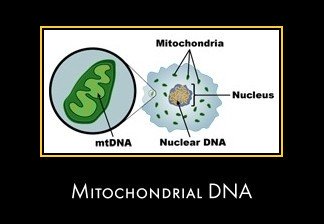|
Mitochondrial DNA (mtDNA)Mitochondrial DNA
Mitochondrial DNA (mtDNA) has provided forensic scientists with a valuable tool for determining the source of DNA recovered from damaged, degraded, or very small biological samples. MtDNA is a small circular genome located in the mitochondria, which are located outside of a cell's nucleus. The Majority of human cells contain hundreds of copies of mtDNA genomes, as opposed to two copies of the DNA that is located in the nucleus. This high copy number increases the likelihood of recovering sufficient DNA from compromised DNA samples, and for this reason, mtDNA can play an important role in missing persons investigations, mass disasters, and other forensic investigations involving samples with limited biological material. In addition, mtDNA is maternally inherited. Therefore, barring a mutation, an individual's mother, siblings, as well as all other maternally-related family members will have identical mtDNA sequences. Consequently, forensic comparisons can be made using a reference sample from any maternal relative, even if the unknown and reference sample are separated by many generations. (Information provided by the Department of Justice) |
